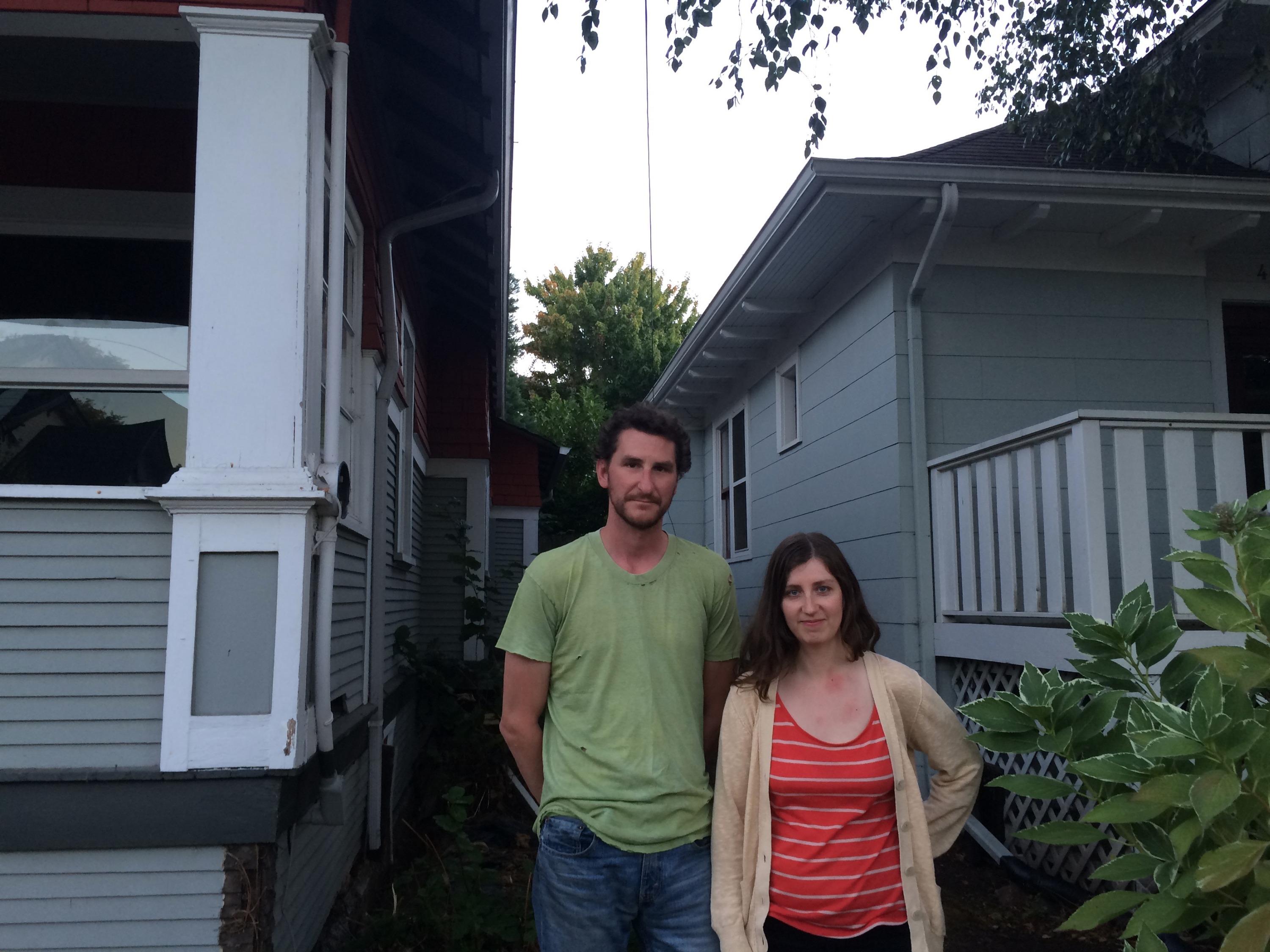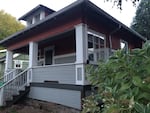
Chris Palochak and Caitlin Poliak stand in between their home, right, and home soon to be demolished. Their 9-month-old daughter's bedroom is only a few feet away from the demolition site. They're worried their 9-month-old daughter could be exposed to lead dust released when walls coated in lead-based paint are demolished.
Tony Schick / OPB/EarthFix
Caitlin Poliak’s 9-month-old daughter sleeps in a bedroom about 5 feet from an old house that could soon be a heap of scrap wood, broken glass and toxic dust.
The 105-year-old house on Sherman street in Southeast Portland is coated with lead-based paint inside and out, and it’s slated for demolition.
Houses are packed tight in the neighborhood. Richmond Elementary School is little more than a hundred feet from the demolition site.
Neighbors around the old house worry the demolition will send particles of lead into the air and soil where children live and play, but property developer Mike Hubbell has declined to instead dismantle the house to reduce dust, as neighbors have demanded.
“When they go in and do a full demolition, it’s just crushing everything and the dust can get everywhere,” Poliak said. “Lead exposure in children, I’m learning more about it, but it’s pretty scary.”
Lead is toxic to the point that health officials warn no amount of it in a child’s bloodstream is safe. Exposure can do lasting damage to a young child’s brain.
Demolishing old homes can release lead dust that disperses hundreds of feet. Those demolitions have been one the rise in Northwest cities like Seattle and Portland where real estate is booming and old neighborhoods are gentrifying.
While health officials are working to reduce exposure after waves of concern about lead in drinking water and industrial emissions, many say the lack of protections for home demolitions are a gap in regulations.
A week before the scheduled demolition, neighbors to the house on Sherman street found city notices hung over their front door knobs. Each had a list of government agencies to call with concerns.
The notice was of little help to neighbor Kelly Campbell.
“I’ve already called all those different agencies," she said. "None of those agencies actually regulate home demolitions.”
Campbell lives around the corner from Poliak and the demolition site. She has a 7-year-old son. She’s also the executive director of Oregon Physicians for Social Responsibility, a group that advocates for environmental health.
She called at least seven federal, state or local agencies.
“Every agency I talked to I just got passed to another one,” Campbell said. “Every person I talked to was sympathetic. Every person thought this was a problem.”’
Here’s the loophole Campbell, Poliak, and their neighbors have run into: Remodeling or repainting an old home can trigger federal requirements for lead abatement. Total demolitions are exempt.
Perry Cabot, who leads Multnomah County’s lead poisoning prevention program, said he wants to see the Oregon Legislature address the issue.
“I believe there is a real risk for escaping lead dust to come out of these demolition projects,” Cabot said. “And given how close these properties are together in these cases, there is a legitimate concern here.”
Lawmakers abandoned an opportunity address it last year, when they removed language about lead paint from the first draft of a bill that later passed and tightened rules for home demolitions involving asbestos.
The city of Portland recently passed a rule banning demolition for homes built before 1916, requiring them to be deconstructed piece by piece to salvage materials and minimize pollution from asbestos and lead.

This 1911 house on Sherman street in Southeast Portland is scheduled for demolition. Neighbors worry the demolition will release toxic particles from the lead-based paint in the house.
Tony Schick / OPB/EarthFix
It takes effect in October, meaning it doesn’t apply to the house on Sherman. It also covers only a fraction of all homes containing lead paint, which was commonly used for decades after 1916.
“I have a great deal of sympathy for those living in neighborhoods where they are concerned about health and property impacts,” Cabot said.
The lack of rules leaves neighbors at the mercy of developers’ willingness to take extra steps to reduce lead dust.
That's what led to conflict between residents in Southeast Portland and the Portland Development Group, which owns the property on SE Sherman Street.
“We don’t negotiate with what we’re doing with the house,” said Mike Hubbell, founder of the Portland Development Group.
“We own the property,” Hubbell said. “We don’t go telling the neighbor how to water their garden or how to paint their house or what they’re doing.”
Poliak and other neighbors phoned and emailed voicing concerns about lead dust, which she said representatives from the company initially didn’t take seriously.
“He said ‘maybe it’ll be rainy and you’ll get lucky. It’ll be rainy and that’ll keep the dust down’,” she said.
Hubbell doesn’t believe the current plans for demolition pose any risk.
“It’s not that we don’t want to listen,” Hubbell said. “But we know how to take precautionary steps to ensure that their interests are protected as well as ours.”
When neighbors pressed the issue, the relationship with Hubbell’s company tensed.
According to an email, a representative from the Portland Development Group told their lead testing company “we got crazy neighbors.”
One of those neighbors, Kelly Campbell, has a sewer line that runs underneath the home due to be demolished. To continue with that arrangement, the developers would need to grant Campbell an easement -- which required an on-site inspection.
But Campbell didn’t want to allow that until she saw a written plan for lead abatement.
When she asked the company to agree in writing to deconstruct the house according to the City of Portland’s new rule, the developers began to warn her what would happen if she didn’t agree to the easement.
They said the sewer delay was eating into their profits. They told her she’d need to install a new sewer line, which they said would cost her $15,000.
One email Campbell received stated “2 things will happen. You will get a new sewer line and we will demolish that house according to existing guidelines. Let’s not cost each other thousands of dollars.”
Hubbell later sent a letter with an intention to cap her sewer line and later accused her of extortion during an interview.
“Our options really were to let them in or force the city to do an emergency sewer extension and that would cost us and our neighbor money that we don’t really have,” Campbell said.
Within days, Campbell relented and they agreed to keep the sewer line.
Then another neighbor intervened: State Senator Diane Rosenbaum.
Rosenbaum sent the Portland Development Group a letter asking it to deconstruct the house rather than demolish it, saying her constituents made a reasonable request to protect their health and that she was “ appalled that the demolition may take place without taking adequate safeguards to prevent lead dust contamination.”
Hubbell wrote back telling Rosenbaum “the individuals that have threatened, blackmailed and tried to coerce will look foolish when this is all completed.”
He declined to deconstruct the house and said he would comply with current rules.
However, Hubbell’s company has since informed the City of Portland and nearby Richmond Elementary that it will take some steps to reduce lead dust: The house will be watered down, some parts will be taken apart piece by piece and the company will install a fabric barrier to trap dust.
Rosenbaum was not satisfied.
“It shouldn’t matter what neighborhood the house is in or who lives next door,” she said. “We should have responsible companies that are good stewards in the neighborhood.”
Poliak said she appreciates the steps being taken but said she’s gotten conflicting accounts of the developer’s plans, and isn’t sure what to expect come demolition time. She and her husband and daughter plan to stay elsewhere during the demolition.
Richmond Elementary is planning for indoor recess those days.
OPB's Rob Manning contributed to this report.
